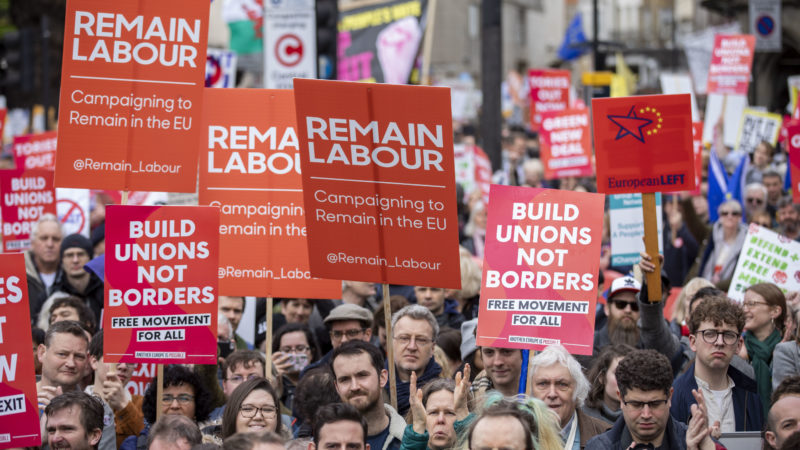
The votes of Labour MPs will be crucial in determining whether Boris Johnson’s Brexit deal gets through parliament. Official Labour policy is to support a referendum but is silent on whether the party would support a Remain option; the leadership’s efforts during conference to stop Labour moving to fully support Remain suggests that they genuinely believe this ambiguity is a vote-winning strategy. However, the 19 Labour MPs who wrote to the EU last week – mainly from Leave-voting areas – went further and actively called to exit the EU with a compromise deal. The votes of these MPs could be enough to get Brexit over the line.
Conventional wisdom has it that the North voted Leave, South voted Remain, working-class people voted Leave, middle-class people voted Remain. The default assumption is that Labour Remain voters are mostly clustered in safe London seats, whereas Labour voters in the North and the Midlands (where many of the key Tory/Labour marginals are found) are mainly Leavers.
But any and all reasonable analysis of polling and voting data proves this wrong. For a start, lumping huge regions of the country together in a North/South divide makes no sense. Most of the big cities in the North – Manchester, Liverpool, Leeds, etc – voted Remain, whilst the Home Counties and many rural areas in the South voted Leave. In London, which is usually portrayed as a hermetically sealed bubble of Remainers, four in ten people actually voted Leave.
Meanwhile, something that political scientists have been patiently repeating for some time but has received worryingly little attention outside academia, is that even in constituencies that overall voted to Leave a majority of Labour voters were Remainers. This seems counter-intuitive, but even in heavily Leave-voting areas there were substantial numbers of Remain voters. For example, in Stoke, there was a 31% vote for Remain and the vast majority of those would have been Labour voters. The 69% of Leavers would have been made up principally of Tories/UKIP voters, a smaller number of Labour voters and people who did not vote in 2017.
It is worth remembering that although a majority of working-class people voted Leave, age and education were far more important than class in determining referendum vote. A majority of young working-class people voted Remain – yet this group was affected most by austerity and the downsides of globalisation. It is also a demographic who overwhelmingly support Labour. Meanwhile, the results of the European parliament elections saw Labour come third behind the Liberal Democrats, backing up the evidence from polling. In those elections, for every one voter Labour lost to the Brexit Party, it lost between three and four voters to Remain parties.
One reason for Labour to pay more attention to its Leave voters than to its larger number of Remain voters would be if the Leavers care more about Brexit and are therefore more likely to switch away from Labour. However, research I carried out with Professor Christina Pagel of University College London disproves this. It turns out that Remainers care more about staying in the EU than Leavers care about leaving it; Leavers are divided about how they want to leave and in some cases would rather Remain than a Leave option they disliked.
Although there is a sense of Brexit war-weariness in the country, “getting Brexit done” is harder than it looks. Most Leave voters now want to exit the EU without a deal, which is something that Labour vehemently opposes. Numbers from our research in September show that the compromise option of leaving with a deal, advocated by those 19 Labour MPs, is the least popular outcome, whereas the option supported by the largest number of people is simply to Remain in the EU. And for Labour voters Remain is by far the most popular option.
In summary, a majority of Labour voters are Remainers, and this is true throughout the country. Most of those Remain voters still want to stay in the EU and they care more about Remaining, than Leavers care about Leaving. In the most recent set of nationwide elections, Labour overwhelmingly lost votes to parties with a clear Remain position and in any case most Leave voters want to exit the EU without a deal, which Labour opposes.
The leadership’s ambiguous position has not been helpful for Labour’s position in the polls but the situation could turn disastrous for the party, if it ends up being a handful of Labour MPs that facilitate the Tories taking Britain out of the EU with this Hard Brexit deal. Labour Remainers defecting to a more obviously Remain-supporting party are a bigger threat to slender Labour majorities than Labour Leavers, and this is as true in Stoke as it is in Canterbury.
The message to any Labour MP thinking of voting for Boris Johnson’s deal is that it would not only be hugely damaging to the country and their constituents, but deeply damaging for the Labour Party too. If Labour really is for the many and not the few, then all Labour MPs must oppose Boris Johnson’s deal and support the majority of Labour members and voters who want to remain in the EU.




More from LabourList
Almost half of Labour members oppose plans to restrict jury trials, poll finds
‘How Labour can finally fix Britain’s 5G problem’
‘The University of the Air – celebrating 60 years of Harold Wilson and Jennie Lee’s vision’